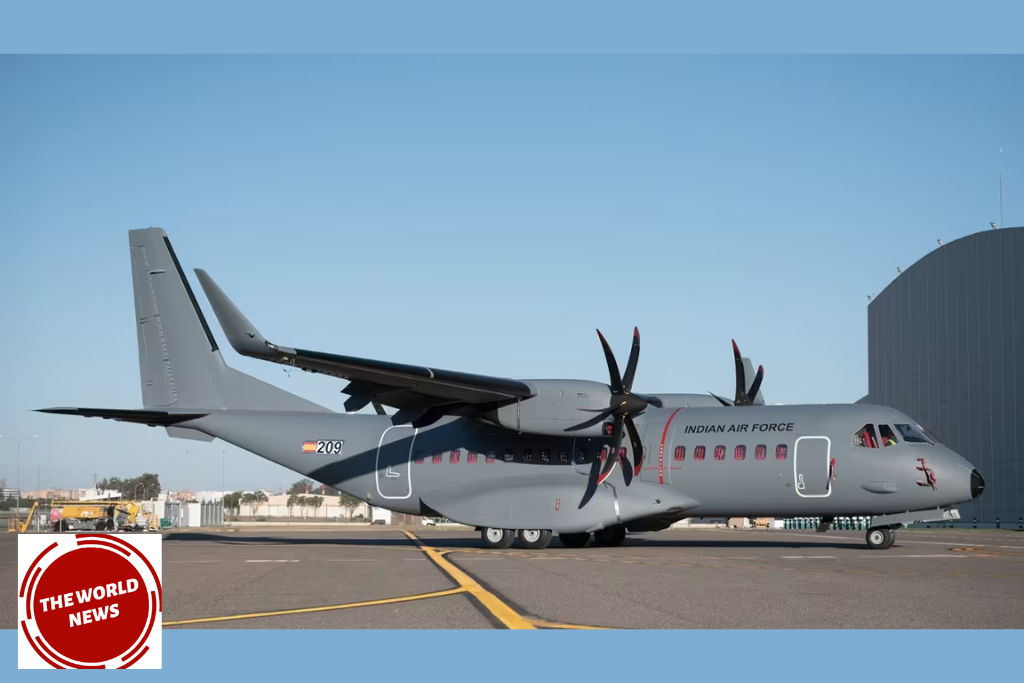The Indian Air Force (IAF) recently celebrated the delivery of its first C-295 transport aircraft from Airbus Defence and Space, marking a key step in modernizing its transport fleet. With the completion of this milestone, a revolutionary project that will replace India’s outdated Avro-748 fleet and increase its defense industrial independence officially gets underway. India made a significant advancement in improving its strategic airlift capability with the arrival of the first C-295. An in-depth analysis of this significant development is provided in this blog article, which also examines the C-295’s features, ramifications, and potential in the Indian defense sector.
I. The C-295 Project: A Game-Changer for Indian Air Force
1.1 Background and Project Scope
- The IAF initiated the C-295 project to modernize its transport fleet, targeting the retirement of aging Avro-748 aircraft from the 1960s.
- The project, with a total cost of ₹21,935 crores, involves the procurement of 56 C-295 aircraft.
1.2 Delivery and Assembly
- Airbus will deliver 16 aircraft in flyaway condition, while the remaining 40 will be assembled in India at Tata Advanced Systems Limited (TASL) facility in Gujarat’s Vadodara.
1.3 Timeline
- The first C-295 aircraft is set to arrive in India soon, with a formal induction ceremony scheduled at the Hindon airbase later this month.
- The second C-295 is in the final assembly stages at Airbus’s Seville facility and will be delivered in May 2024.
- The last of the 16 flyaway aircraft will be handed over by August 2025, with the first ‘Made in India’ C-295 rolling out in September 2026 and the remaining 39 by August 2031.
II. Self-Reliance and Indigenous Manufacturing
2.1 Prime Minister Narendra Modi’s Vision
- In October 2022, Prime Minister Narendra Modi laid the foundation stone for the Vadodara manufacturing facility.
- The C-295 project represents a significant step towards realizing the ‘Make in India’ initiative in the defense sector.
2.2 Private Consortium Manufacturing
- The C-295 is the first military aircraft to be manufactured in India by a private consortium, indicating a shift towards greater self-reliance.
2.3 Components and Integration
- More than 13,000 parts, 4,600 subassemblies, and all major component assemblies will be manufactured in India.
- Airbus will provide critical components such as engines, landing gear, and avionics, which will be integrated into the aircraft.
III. C-295 Features and Capabilities
3.1 Payload and Personnel Capacity
- The C-295 boasts a maximum payload capacity of up to 9 tonnes.
- It can accommodate 71 personnel or 45 paratroopers, making it a versatile asset for troop transport and humanitarian missions.
3.2 Speed and Versatility
- With a maximum speed of 480 km/h, the C-295 can swiftly respond to a variety of operational demands.
- It can operate from short or unprepared airstrips, enhancing its suitability for diverse mission profiles.
3.3 Para-Dropping and Cargo Operations
- The aircraft features a rear ramp, enabling para-dropping of troops and cargo, further expanding its operational flexibility.
IV. Strategic Implications
4.1 Strengthening India’s Defense Capabilities
- The induction of C-295 aircraft enhances the IAF’s strategic airlift capabilities, enabling rapid deployment of troops and equipment.
- It bolsters India’s ability to respond effectively to regional and international security challenges.
4.2 Reducing Dependence on Aging Fleet
- The retirement of the Avro-748 fleet, which has served for over six decades, is a critical step towards improving operational efficiency and safety.
4.3 Economic and Technological Growth
- The ‘Make in India’ aspect of the project fosters economic growth by creating jobs and promoting indigenous manufacturing.
- The transfer of technology and expertise from Airbus to Indian partners enhances the country’s technological capabilities.
V. Logistics and Support
5.1 Performance-Based Logistics Support
- The C-295 contract includes performance-based logistics support for five years, ensuring the aircraft’s sustained operational readiness.
5.2 Supply of Spares and Ground Support
- Spares will be supplied across 10 operating bases for 10 years, ensuring a steady supply chain.
- Ground support equipment will be provided to facilitate maintenance and operations.
5.3 Training
- Comprehensive training programs are integral to the project, ensuring that personnel are skilled in operating and maintaining the C-295 fleet.
Conclusion
The delivery of the first C-295 aircraft to the Indian Air Force signifies a significant milestone in India’s defense modernization efforts. With its impressive capabilities and the promise of indigenous manufacturing, the C-295 project not only enhances the IAF’s operational prowess but also underscores India’s commitment to self-reliance in defense production.
As more C-295 aircraft are delivered and assembled in India, the country takes a giant leap toward becoming a prominent player in the global defense manufacturing arena, while ensuring its national security is robustly supported by a modern and versatile fleet of transport aircraft.
Stay updated with the latest news at The World News.



